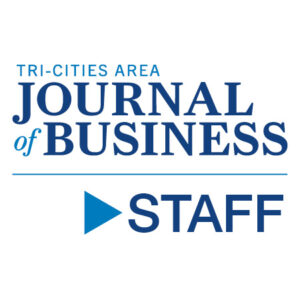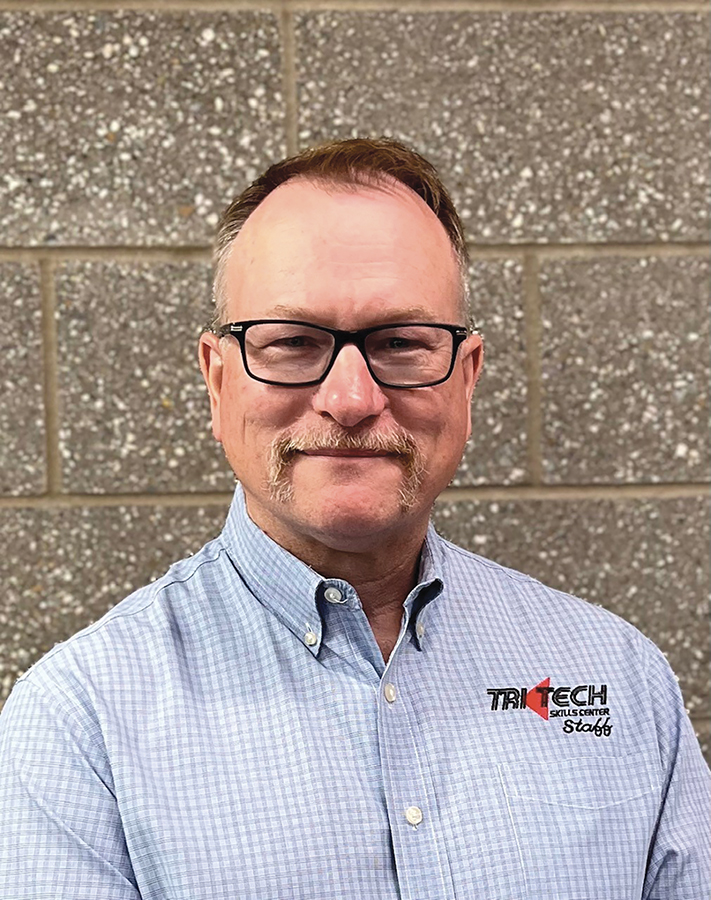
Home » Q&A with Paul Randall
Q&A with Paul Randall

September 12, 2022
Paul Randall
Director
Tri-Tech Skills Center
Number of employees you oversee: 41
Tell us about Tri-Tech and how it fits into the secondary education system.
Tri-Tech Skills Center (TTSC) is a premier school of choice and graduation pathway for students pursuing and preparing for careers, college, and prosperity.
TTSC is a regional cooperative school owned by the Pasco, Richland, Finley, Columbia-Burbank, Kiona-Benton City, North Franklin and Prosser school districts, and hosted by the Kennewick School District. Since 1981, Tri-Tech has been serving as an extension, or branch campus, of all area high schools by providing preparatory career and technical education (CTE) programs which cannot be sustainably offered in a comprehensive high school due to expensive and specialized facilities, high operative and equipment costs or not enough student enrollment at the school.
TTSC is one of 17 skills centers in the state offering high quality, tuition-free CTE programs and professional training for high school students.
TTSC is designed to help students get a head start on their career goals by providing free and focused training in specific high demand professions and transferable employability skills needed in all career-paths.
Programs are designed in half day blocks allowing extended time to not only learn the theory of a subject but to also get real hands-on experience. The programs also are personalized. Instructor-to-student ratio is low, allowing the skills center staff the time to get to know each student and address their unique learning styles.
How did you land your current role?
I was fortunate to have people see the potential and then invest and believe me and provide an opportunity. I am thankful to Bruce Hawkins, Debbie McClary and Gerry Ringwood, who are longstanding CTE leaders and educators who took a chance and hired me.
How long have you been an educator?
Since 1991.
Why should the Tri-Cities care about the skills center?
TTSC is a wonderful experience for all students. It provides hands-on and relevant preparatory programming setting the stage for student success whether they choose to enter the career path or not, as students develop lifelong transferable employability skills in all the programs. TTSC help students strategically plan with a career in mind, preparing them for the workforce and post-secondary education. TTSC serves as a capstone for high school CTE programs and launch to post-secondary options providing rigorous and relevant CTE programs.
TTSC is connected and responsive to business and industry through advisory committees to help meet labor needs.
Recent examples of TTSC response to industry need are the pre-electrical and pre-physical therapy programs. Both have strong employment outlook and provide family living wages. Future programs we are researching are pre-medical assisting and heating, ventilation, air conditioning and refrigeration (HVAC-R).
What is one characteristic that you believe every leader should possess?
Humility.
What is the biggest challenge facing secondary schools that focus on job-development?
Effectively communicating the opportunity CTE provides. Students participating in CTE classes and especially the programs at Tri-Tech set themselves up for success. Helping parents recognize and sending school counseled students toward the free technical training, college credit and industry recognized credentials available.
Facilities. Skills center facilities are constructed with state capital dollars and not with local school district construction bonds therefore we rely on the Legislature for funding. TTSC has been fortunate receiving capital funds as evidenced by the recent 2020 addition to the front of the building – drive by, it looks fantastic!
The next project is the modernization of the original 41-year-old building. It has been maintained well but is at the end of its life.
What challenges do you have recruiting teachers with the skill sets that match your programs?
Awareness: Industry subject matter experts can become teachers by using their work experience as candidates do not need to have a university education degree. The state of Washington has several avenues for teacher certification and one is the Business and Industry Route to Career and Technical Education program. We hire capable and experienced candidates and then provide the pedagogy classes.
Offering competitive wages: It is challenging in some of our program areas (pre-electrical, welding technology, health care and information technology) to compete with industry wages. Educator wages have increased but there is still a need.
How do you balance the career interests of students with what industry partners say they need from their future workers?
Tri-Tech is a school of choice with students selecting programs in which they have an interest. The programs offer content specific training in a subject matter (culinary arts, pre-nursing or game design, a computer science program) preparing students to enter the workforce as a higher performing entry-level employee which meets the needs of industry partners. Students are also primed to engage with the next level of training and education. They are also exposed to all aspects of the career path.
Pre-nursing is a good example: A student may discover during the program that direct patient care is not for them. This alone is a success as they have not spent time and tuition at college on prerequisites to enter a nursing cohort they may leave. While in the program they will be introduced to the many other facets in health care and will be encouraged to explore other options such as a career in billing/coding segment of health care.
How important are industry partnerships to Tri-Tech?
Partners are the foundation to TTSC success. Every one of the programs has a specific advisory committee which meets multiple times a year to guide and direct the program. Advisories consist of representatives from business and industry, labor, post-secondary pathways, community members and education stakeholders.
Other key partners are agencies and community and professional organizations such as the Tri-Cities Home Builder Association, Benton Fire District 1, area Rotary Clubs and other service clubs, Habitat for Humanity, The STEM Foundation, Career Connect Washington, Tri-City Regional Chamber of Commerce just to name a few. Without partners, we would be dead in the water.
If you had a magic wand, what would you change about your field?
There would be an internship or job available for every qualified student. We work diligently to make the connections but there’s not enough time or resources to meet the need.
What advice would you give someone going into a leadership position for the first time?
Listen and lead with patience. Pay attention to the wise advice around you, dismiss the lousy and then lead courageously. Stay focused on the goal.
Who are your role models or mentors?
Gerry Ringwood is a key mentor. I have worked with Gerry for over two decades and still learn. He is the model of integrity, thoughtfulness, work ethic with a continued focus on doing what is right.
Byron Gjerde provided the role model to develop a high-quality diverse team – a large group vocal ensemble in this case. He recruited members with a variety of skills and abilities all with the eye towards “what could be.” He selected members on how they potentially would work together – the blending of voices – not all superstars but role players as well. The group had four months to prepare for a high-stake live performance. Byron focused us on a clear purpose and empowered us to “play to our strengths” resulting in a wonderful, shared experience I recall 40 years later.
How do you keep your team motivated?
Stay focused on the students, do my best to help and provide resources for the instructional staff to their best every day.
How did you decide to pursue the career that you are working in today?
CTE was attractive to me because of the clear and tangible outcomes for students, and the benefit to our businesses, community and economy. I wanted to be a part of something that made a difference. CTE is a place where students bring together their acquired academic knowledge (math, English and science) and begin to apply the skills in a relevant context and make the connections to the real world.
A good example is from our construction trades program. One student graduated on Saturday and went to work on Monday. He was equipped with the tools to be successful, thanks to a Rotary Tool and Equipment Scholarship.
Fast forward to today – he’s a proud father of two beautiful daughters, a homeowner and a foreman at his job site. He’s making a difference not only for his family, but for our community and our economy. I like being a part of this story.
How do you measure success in your workplace?
Happy and successful staff encouraging and equipping students for the next step in their development.
What do you consider your leadership style to be?
Servant leadership
How do you balance work and family life?
Not well at times but getting better.
What do you like to do when you are not at work?
Family, cooking, old cars and time on the river.
What’s your best time management strategy?
Outlook calendar
Best tip to relieve stress?
Having clear boundaries. Walking and being on the water.
What’s your favorite book?
I love Audible. My latest reads (or listens) are: David Brooks’ “The Second Mountain: The Quest for a Moral Life,” “Four Thousand Weeks” by Oliver Burkeman, the last two Ken Follet books and Eugene Peterson’s writings.
Do you have a personal mantra, phrase or quote you like to use?
“Let’s put a bow on it.”
Q&A Local News Education & Training
KEYWORDS september 2022






